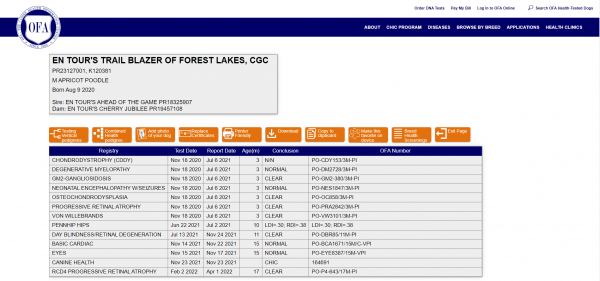Healthy Testing Info for Puppy Buyers
PUPPY BUYERS: Arm yourself with knowledge!
Prior to seven years ago, we were in the same place as you might find yourself. As puppy buyers we often simply don’t know what we don’t know. So as not to be misled, most of us can search out pertinent information on reputable sites and educate ourselves – once we know what to look for!
The Orthopedic Foundation for Animals (OFA) owns and maintains the database of canine health testing results in the U.S. They use the parent breed club recommendations, in our case Poodle Club of America (PCA), to establish the minimum requirements to earn a Canine Health Information Center (CHIC) certification. Please note the wording “minimum requirements”. There are many other valuable tests that can be done to ensure breeding dogs are less likely to reproduce known genetic health issues.
These are the published OFA requirements for Standard Poodles and should be completed before breeding (at minimum):
- Hip X-Rays – OFA or PennHip evaluation (OFA must be done after dog reaches 24 months, Pennhip after 4 months, for certification that is valid for the life of the dog)
2. Eye Examination – ACVO Ophthalmologist exam (eye exam certification is good for 12 months from the date of the exam)
3. Health Elective (one of the following): - OFA Thyroid evaluation – blood test to detect hypothyroidism which typically manifests between 2-5 years of age across breeds 3-4 years in standard poodles
- OFA Sebaceous Adenitis evaluation – a skin biopsy to detect this hereditary disease (no DNA test for it yet) but has high rate of false negatives
- Congenital Cardiac Exam – ACVIM examination to detect congenital heart disease
- Advanced Cardiac Exam – OFA evaluation which can be done after 12 months of age, the certification is good for the life of the dog
- Basic Cardiac Exam – OFA evaluation which can be done after 12 months of age, the certification is valid for 12 months from the date of the exam

The CHIC symbol indicates a dog has completed the MINIMUM health tests, but does not necessarily mean the dog ‘passed’ all of the health tests, especially regarding hips.
Poodle Club of America also recommends the following DNA tests:
1. Neonatal Encephalopathy with Seizures (NEwS)
2. vonWillebrand’s Disease Type I (vWD)
What else can we do?
Dog owners today also have the ability to DNA test for a number of other standard poodle genetic diseases, and the list is constantly growing as new discoveries are made. Breeders can make informed decisions about their breeding dogs with this collection of knowledge. We share this knowledge on our Health Info page and update as new tests/information becomes available.
- Progressive Retinal Atrophy (PRA-PRCD)
- Progressive (PRA-RCD4)
- Day Blindness/Retinal Dysplasia (DB/RD)
- Degenerative Myelopathy (DM)
- GM2 Gangliosidosis (GM2)
- Osteochondrodysplasia (SLC13A1)
- Intervertebral Disc Disease Type 1 (IVDD1)
Another site for credible information about poodles is Versatility In Poodles, Inc.
Understanding what a breeder is telling you will help you, as a puppy buyer, make informed decisions as well. So let’s take a look at an example in the OFA database for a young male, Blaze. Click on Search OFA Health-Tested Dogs in the top right. You can search a dog’s AKC registration number or its AKC registered name. The results of the search will appear and you will have to click on the desired dog in the list.
The site will then display the tests that have been submitted to OFA. Look under the 5th column for the test results.

Be sure to check the date of the exam to confirm the cardiac and eye exams have not expired (eyes and basic cardiac are good for 12 months from the date of the exam).
Due diligence as a buyer:
What if the breeder says they completed the tests, but did not submit them to OFA? Why didn’t they? Can they provide you with copies of the OFA exam document(s)? Can you verify the information with the vet that performed the test? It comes down to what is important to you. What timeline do you think is ‘right’ for them to be submitted – a month, two, six, etc.?
Be aware of what the results mean. For example, Blaze’s owners submitted PennHip results and Blaze’s hip results show LDI is 0.30 and RDI is 0.38. The breed average for standard poodles is 0.46 and PennHip recommends breeding dogs that are 0.46 or lower.
On the other hand, if a dog’s hips were OFA tested, a dog could be CHIC certified with a result of “FAIR” hips. Most reputable breeders of standard poodles will not breed a dog with “FAIR” results even though it received a CHIC number (this may be different in other breeds due to hip history and the size of the gene pool). The breeder may decide to invest in the PennHip exam after this result, and as long as the PennHip is lower than breed average, choose to breed the dog.
Also, don’t be afraid of dogs that carry a recessive disease gene if you are looking for a pet. Breeders would severely limit the gene pool if they eliminated all dogs that were carriers of a genetic disease marker. If all other qualities of the dog are desirable – temperament, structure/conformation, all other health testing and health history, the dog should be allowed to remain in the breeding pool. However, the dog should only be bred to dogs that are clear for the disease.
We are here for you:
How to locate and read this information is similar for all breeds although the tests required and/or submitted may differ. At Standard Poodles of Forest Lakes, we are happy to answer questions regarding health testing poodles. We desire all puppies get every possible advantage for long and healthy lives, and that starts with education and puppy buyer expectations for better quality breeding programs!


